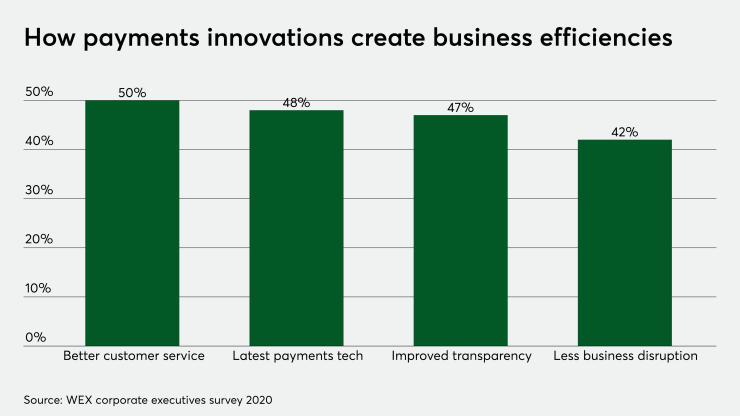Mastercard set out more than a year ago to fix the fragmented B2B payments landscape by developing a global multi-rail strategy modeled in part on streamlined digitized consumer payments platforms like Venmo and Zelle.
It will take years to fully complete the project, but Mastercard on Monday announced the availability of real-time account-to-account corporate payments for U.S. firms through its
Account-to-account B2B payments will be available in all global regions through the service by the end of next year, leveraging The Clearing House’s Real Time Payments, ACH and infrastructure Mastercard acquired from European providers including
Global cards also are supported on Mastercard Track BPS now, following the addition of U.S. cards in May.
Even as the coronavirus pandemic has frozen many aspects of the economy, it has also

“The U.S. lags behind most developed global markets with its heavy reliance on checks for B2B payments, but the pandemic has made it impossible for many companies to do basic paper-based payments, heightening interest in going digital,” Anderson said.
The growing popularity of RTP for B2B payments is also working to accelerate development of Mastercard Track BPS, he said.
“RTP is a relatively recent innovation, and the timing has worked out well all around so now suppliers to say what kind of payments they want to take and when to accept them, which buyers can discover through an API,” Anderson said.
Working with a growing base of global third-party distributors, Mastercard isn’t selling its solution directly to corporations, and it doesn’t see itself as a direct competitor to the rising tide of banks, fintechs and other providers developing specific solutions for accounts payable, accounts receivable and working capital, Anderson said.
“We’ve created an open-loop system that's analogous to how we operate as a card network — but instead of just connecting banks and card users, we’re enabling corporations, banks and fintechs to pick any payment rail through our platform,” he said.
The overall goal for large corporations down to small companies is to optimize transactions based on the growing availability of faster and cross-border payments, and Mastercard Track BPS helps form the backbone for services that directly manage the payments.
The convergence of faster payments and global reach for B2B payments mirrors what’s happened with consumer payments in the past decade, according to Anderson.
“The banking and payments industry spent the last 10 years digitizing consumer payments by getting cards on to phones and modernizing e-commerce. It’s a big job and it’s still not done, but now everyone wants to bring many of those features over to B2B,” Anderson said.
Mastercard launched Track BPS with about a dozen distribution partners, and it’s now adding several more in different global markets.
Key partners include Distribution partners bzPay, Gardenia Technologies, Girasol Payment Solutions, Network International, Pendo Technologies Corp., Plastiq, Today Payments, Transcard, Ukheshe and Yak Pay, Mastercard said.





